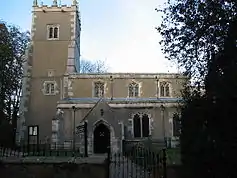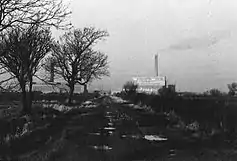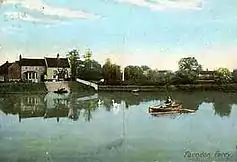Farndon, Nottinghamshire
Farndon is a small village and civil parish on the Fosse road, 2.5 miles (4 km) south-west of Newark-on-Trent, on the banks of the River Trent. The population of the civil parish as of the 2011 census is 2,405. The A46 previously ran through the village until the development of a new dual carriageway bypass.[1] The name Farndon means "Fern Hill". It is thought to be the site of the Roman fort Ad Pontem or "the place by the bridges."[2] The parish church of St. Peter was built in Elizabethan times, and thought to be the third such church built on the same site since Saxon times.
| Farndon | |
|---|---|
 St. Peter's Church | |
 Farndon Location within Nottinghamshire | |
| Population | 2,405 (2011) |
| District | |
| Shire county | |
| Region | |
| Country | England |
| Sovereign state | United Kingdom |
| Post town | NEWARK |
| Postcode district | NG24 |
| Dialling code | 01636 |
| Police | Nottinghamshire |
| Fire | Nottinghamshire |
| Ambulance | East Midlands |
| UK Parliament | |


St Peter's Church
See St. Peter's Church, Farndon.
Historical
Francis White's Directory of Nottinghamshire described Farndon in 1853 thus:
"Farndon is a well built village and parish on the Trent, 2 miles (3 km) west-south-west of Newark, and contains 590 inhabitants and 1,710 acres (690 ha) of land, mostly freehold, a small part copyhold and leasehold. The principal proprietors are William Buck Esq. and W.R. Brockton Esq. There are also several smaller owners. The Duke of Newcastle is lord of the manor, but owns only a small portion of the land. The church, dedicated to St Peter, is a large and lofty edifice, with two side aisles, chancel and tower, in which are 4 bells. A good organ was put up in the church in 1851...on the Trent side in this parish are several malt kilns, also steam and wind mills. The Wesleyans and Primitive Methodists each have a chapel here."[3]
School
Farndon St. Peter's primary school is in the middle of the village. It replaced the old school c.1960. The headmaster who oversaw the transition between sites was Bernard Jackson known to generations of Farndon schoolchildren as 'Gaffer' Jackson. Gaffer's teaching mostly stressed English and maths.
Farndon Ferry
Until recent years, "there used to be a ferry across the Trent from Farndon to Rolleston."[4]
In August 1948, "the title of Little Hero of Farndon was bestowed on 12-year-old Ronnie Ward, of Northgate, Newark, after he rescued a child from the River Devon by the Farndon Ferry on Thursday. Seeing the four-year-old boy in deep water, Ronnie swam out to him and pulled him to the landing stage from where he was carried back to his mother. Amazingly, Ronnie's parents knew nothing about the rescue until they heard the story from eye-witnesses, because their son was too modest to tell them."[5]
Farndon Fields
During site investigations for the A46 road improvements in the area to the east of the existing Fosse road (the former Roman Fosse Way), a significant Late Upper Palaeolithic archaeological site was identified, and later excavated at Farndon fields.[6]
The site contained a flint scatter, a spread of waste flakes produced by the working of stone using flint knapping to produce sharp edged tools. Dated by the use of Optically stimulated luminescence, it confirmed that the archaeology dated back some 13,000 years making it a rare open field site, as finds from this age were usually only found in caves, such as Gough's Cave and more locally at Creswell Crags, some 20 miles away. It is thought plausible that the same people who used this site also visited the caves at Creswell, and that the repeated visits to Farndon were part of their nomadic subsistence circuit during the year.[7]
The finds at Creswell, showed that these hunters were also artists decorating both the caves and animal bone with depictions of horses, Ibex and other animals, the Robin Hood Cave Horse being one of the notable discoveries of this Creswellian culture.[8]
Describing the finds at Farndon, as "the dream scenario" archaeologist Phil Harding, who is also an expert in shaping stone tools, said "As a flint knapper, you were there with them". It has been imagined that the hunters who produced the scatter, needed to use the new flint tools to flense animal carcasses at this seasonal camp, situated on a river terrace overlooking the River Devon near to its confluence with the River Trent.[9]
Football
Farndon United football club, which was started in 1970 play in the Newark Football Alliance League. In the 2005/06 season they won the treble honours of becoming league champions, and winning the Willie Hall and Sam Arnold Cups. A feat only achieved by their league rivals from the New Inn and the RHP Sports & Social football teams.[10]
Bus services
- Marshalls
- 90, 90A: Nottingham – Trent Bridge – Gamston – East Stoke – Farndon – Newark – Balderton
- 23: Farndon – Elston – Long Bennington – Grantham – Please note that this is a school bus
- Premiere Travel
- 54: Bingham – Flintham – Elston – East Stoke – Farndon – Newark
Notes
- "Civil Parish population 2011". Neighbourhood Statistics. Office for National Statistics. Retrieved 8 April 2016.
- Nottinghamshire: history and archaeology | Miscellaneous articles: Summer excursion 1900: Newark and Farndon
- F. White "Directory of Nottinghamshire" (Sheffield, 1853)
- "Farndon Pubs and Inns". nottspubs.co.uk. Archived from the original on 17 August 2013.
- "Archived copy". Archived from the original on 1 October 2006. Retrieved 19 November 2006.CS1 maint: archived copy as title (link)
- "Following the Fosse Way through Nottinghamshire Archaeology and the A46" (PDF). highways.gov.uk. Archived from the original (PDF) on 16 September 2016. Retrieved 18 July 2013.
- "Farndon Fields". megalithic.co.uk. Retrieved 18 July 2013.
- Bahn, Paul (2003), "Art of the Hunters", British Archaeology (72). Retrieved 7 March 2012.
- Pitts, Mike (2010), "news (A moment in the life of an ice age hunter – unique find)", British Archaeology (115). Retrieved 7 March 2012.
- "Farndon United FC". clubwebsite.co.uk. Retrieved 24 August 2013.